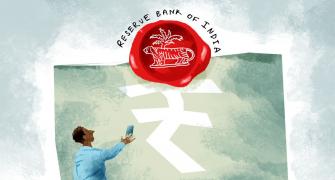Borrowing from a fraudulent loan app subjects the borrower to a variety of risks.

The Financial Stability and Development Council (FSDC) recently called for more measures to curb lending by unauthorised loan apps.
While the regulators work on making the landscape safer for borrowers, the latter need to exercise caution.
Evolving modus operandi
The influx of unauthorised apps into Google Play Store has decreased significantly since the peak of 2019-2020.
"Now we only encounter three to five such apps on Google Play Store each week. Google and various agencies, including us, keep an eye on Play Store," says Sugandha Saxena, CEO, Fintech Association for Consumer Empowerment (FACE).
Complaints from association members' customers also help them identify rogue apps quickly and inform Google, she adds.
Fraudsters are now disguising their apps.
"Some claim to be calculators, loan guides, etc. to bypass initial scrutiny. Once approved, they introduce the lending feature," says Saxena.
They increasingly use Instagram and Facebook.
"They lure users with engaging content, then direct them to pages mimicking Play Store, and prompt them to download APK (Android Application Package) files," says Saxena.
Dire consequences
Borrowing from a fraudulent loan app subjects the borrower to a variety of risks. One is exorbitant interest rates and hidden fees.
"Borrowers may find themselves trapped in a debt cycle due to interest rates as high as 100-200 per cent, hidden charges, and penalties," says Gaurav Jalan, founder and CEO, mPokket.
Some apps may collect a processing fee and disappear without disbursing the loan.
Borrowers who do manage to secure a loan may soon face aggressive and harassing calls demanding repayment, often within a short timeframe.
"Defaulting on payments could subject borrowers to constant harassment and threats," says Jalan.
Many fraudulent loan apps require access to borrowers' personal information stored on their phone's contacts, gallery, etc.
Borrowers may soon find their privacy compromised as these apps resort to misuse of personal data.
"If you are unable to pay back the loan, they might send messages to your contacts to shame you," says Vishal Dhawan, chief financial planner, Plan Ahead WealthAdvisors.
Red flags to watch out for
Be wary of an app that asks for too much personal info.
"Legitimate lenders will not ask for information beyond the basic know your customer (KYC) details," says Jalan.
If an app is poorly designed or unprofessional, it could be a signal that something is amiss.
Remain sceptical of unsolicited communications and links promising quick loans.
Watch out for apps that can be downloaded via links embedded within texts or emails.
Aggressive marketing tactics should also serve as a red flag.
"Illegal apps might bombard you with calls or messages to pressurise you into taking action," says Jalan.
Demand for upfront payments or processing fees should also make you wary.
Do the due diligence
Before downloading an app, conduct thorough research on it.
"The Reserve Bank of India publishes a list of apps referred to as a whitelist. Stick to it," says Dhawan.
Verify if the app has partnered with a regulated entity (RE), in accordance with the RBI's digital lending guidelines.
"These guidelines require partnerships between a regulated entity and a digital lending app to be clearly listed on the RE's official Web site," says Saxena.
Avoid apps that claim to have an association with an unknown or suspicious RE.
Check the app's number of downloads. "This information will tell you whether it has been operational for long and if many people have used it," says Saxena.
Reading user reviews and reports of suspicious activities can provide insights into potential risks.
Review the permissions the app asks for. Jalan suggests granting access to necessary information only.
Download apps from Google and Apple app stores only. Ensure that interest rates and terms are fair and transparent.
"The new RBI guidelines mandate disclosing the annual percentage rate (APR), the key facts statement (KFS), terms and conditions, privacy policies, and so on. Additionally, they require upfront fee disclosure," says Jalan.
Finally, after you have taken the loan, ensure you receive detailed documentation outlining loan terms, repayment schedule, and other pertinent information.

Disclaimer: This article is meant for information purposes only. This article and information do not constitute a distribution, an endorsement, an investment advice, an offer to buy or sell or the solicitation of an offer to buy or sell any securities/schemes or any other financial products/investment products mentioned in this article to influence the opinion or behaviour of the investors/recipients.
Any use of the information/any investment and investment related decisions of the investors/recipients are at their sole discretion and risk. Any advice herein is made on a general basis and does not take into account the specific investment objectives of the specific person or group of persons. Opinions expressed herein are subject to change without notice.
Feature Presentation: Ashish Narsale/Rediff.com










